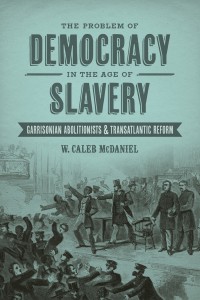Caleb McDaniel, The Problem of Democracy in the Age of Slavery: Garrisonian Abolitionists and Transatlantic Reform (Louisiana State University Press, 2013) 376 pages.
Review by Benjamin E. Park
Caleb McDaniel’s thoughtful and provocative book is a reclamation project of sorts: it seeks to restore William Lloyd Garrison and Wendell Phillips as serious democratic thinkers and devotees to America’s democratic experiment. Even more, it aims to place their democratic thought within an Atlantic framework while still emphasizing their domestic commitments. A central argument found in the book is an attempt to restore Garrison’s love of the American nation. Yes, he burned the Constitution; yes, he denounced the country’s leaders as hypocritical; yes, his newspaper’s masthead said his country was “the world.” Yet undergirding much of his abolitionist message was a firm belief that America possessed a special role and that slavery prohibited the country from accomplishing its destiny. Indeed, McDaniel explains, “Garrison’s idea that the United States should be a model for the world played an underappreciated role in spurring his abolitionism in the first place” (22). Even while he believed the current manifestation of the American government was corrupted, he maintained that the republican principles established at the nation’s founding were worthy of redemption.
The book’s first part, “Origins,” includes three chapters that trace the general background and figures behind the Garrisonian movement. McDaniel devotes an entire chapter to Garrison’s developing abolitionist thought, and traces four key influences: the Federalist newspapers which Garrison helped produce, and where he learned of global events that would shape his cosmopolitan view of reform; European Romantic poetry, which helped him conceptualize of Lord Byron-esque heroes who could lead reform movements; Quaker Abolitionist Benjamin Lundy, who taught him the extent of the nation’s shame of slavery; and finally, black authors who convinced him that colonization was wrong and that immediate abolition was the only satisfactory resolution to the slavery problem. The book then turns to the nature of transatlantic reform in the nineteenth century. Garrison, like many other abolitionists, believed that “foreign appeals could mobilize patriotic shame” (47), and thus sought to bring many foreign thinkers to speak on American soil. Yet this brought opposition, as many in America were already wary of foreign influence. But the relationship continued, as “the forces  pulling [Abolitionists] to Great Britain were stronger than the forces that pushed them away” (59). Throughout the many forms of opposition, Garrison remained a resolute transatlantic thinker.
pulling [Abolitionists] to Great Britain were stronger than the forces that pushed them away” (59). Throughout the many forms of opposition, Garrison remained a resolute transatlantic thinker.
Readers of this site will most likely be interested in the second part of the book, “Ideas,” which focused on Garrisonian intellectual problems like public opinion, nationalism, aristocracy, and influence. And intellectual historians will rightly be pleased with McDaniel’s arguments because he reaffirms the importance and centrality of ideological problems at the heart of the Garrisonian movement. In Chapter Four, “The Problem of Public Opinion,” McDaniel subtly traces the influence of Alexis de Tocqueville and John Stuart Mill on Wendell Phillips, offering an acute analysis of transatlantic discussions concerning democracy’s ills in the mid-nineteenth century. The next chapter reveals the matrix of sources—Biblical Christianity, John Humphrey Noyes, and non-resistance—that led to a multivocal critique of nationalism yet a persistent commitment to patriotism. Chapter Six places the Garrisonians’ accusations concerning the “slave oligarchy” in the context of broader Atlantic attacks on aristocracy in general, which brought their commitment to egalitarian democratic practice into sharper view. And the final chapter in the “Ideas” section delved into a paradox at the heart of Garrison and his followers: while they eschewed political participation and voting, they still craved a way to extend their influence.
Put simply, in these four chapters, McDaniel delivers to intellectual historians the type of close-reading of public thinkers who engage serious ideas that we often yearn for. Without overlooking cultural and social contexts of Garrison, Phillips, Thompson, and a myriad of others, The Problem of Democracy in the Age of Slavery is an example of how political and ideological debates were central to some of America’s most pressing issues on the eve of the Civil War. Even more, McDaniel demonstrates that these intellectual discussions took place within a vibrant and evolving Atlantic political body: these thinkers struggled with the French Tocqueville, drew from Giuseppe Mazzini, overlapped with the British Chartists, and looked to the Irish Daniel O’Connell. Ideas mattered, and they were cultivated in a geographically broad climate. This both validates the field of intellectual history as well as furthers its relevance to other arenas of study.
Part Three of the book returns to the chronological development of Garrison and his circle by focusing on three key events: the transatlantic revolutions ignited in 1848, the Civil War, and reconstruction. The European revolts of the late 1840s rocked the Garrisonians’ hopes for victory, but it also forced them to find new ways to agitate public opinion, and demonstrated their close relationship to transatlantic networks. Then the rise of the Republican Party, on the eve of sectional war, marshaled in a new age of political convergence yet, at the same time, tested the uniting principles of abolitionist thinkers. In the end, the war itself, and the policies that followed it, proved a driving wedge between Garrison and Phillips that revealed disagreements over the democratic process that existed all along. So while emancipation vindicated some of the deepest beliefs of the Garrisonian movement, debates concerning the means to that end revealed that ideas still garnered significant attention in the age of abolition. This concluding chapter ironically adds a somber tone to what would otherwise be a climactic and triumphant conclusion.
In McDaniel’s attempt to prove Garrison, Phillips, and others to be true political thinkers, he often downplays or overlooks the theological sources for their abolitionist arguments. McDaniel emphasizes that Garrison was indeed religious, of course, but in an attempt to prove that he was more than merely a religious zealot he primarily put him in conversation with strictly political thinkers. (The infrequent comparison to John Humphrey Noyes is a notable exception.) This is understandable given the framework in which he places the Garrisonians, but it leaves for other historians to decipher the proper relationship between angst over democracy and yearning for a Christ-centered American republic based on freedom for minority opinions and payment for all forms of labor. For instance, Phillips’s disillusionment with public opinion and tyrannical majorities should not only place him in conversation with secular thinkers like Tocqueville, but religious figures like Sarah Grimké and her Christian pull for gendered equality as well as Joseph Smith and his Mormon call for fringe religious rights. While these questions fall outside the boundaries of McDaniel’s focus, they do demonstrate the boundaries of his theoretical framing of transatlantic reform.
But for the arena on which McDaniel focuses, he succeeds brilliantly. If one were expecting a book simply focused on abolitionism—or even, indeed, a simply detailed overview of Garrisonian antislavery thought—then this book would appear somewhat of a surprise. This is because transatlantic abolitionism in general, and Garrisonianism in particular, are merely case studies in McDaniel’s broader project: to test the boundaries of democratic theory and practice. Indeed, at its most provocative moments, The Problem of Democracy in the Age of Slavery is a work of political theory as much as it is of historical reconstruction, and thus it holds relevance for those interested in political and democratic thought as it does interested in Atlantic antislavery. Garrison and his followers’ commitment to non-participation, yet frequent temptation to evolve into a new democratic approach, introduced sophisticated and anxious political theorizing. By challenging historical categories of democracy that previously marginalized Garrison and his followers as ephete agitators outside the boundaries of America’s political tradition, McDaniel forces us to reconsider what “democracy” really means. The very title of the book, which is an obvious tweak and inversion of David Brion Davis’s classic The Problem of Slavery in the Age of Revolution, encourages historians to problematize political categories we have often taken for granted.
In the end, I enthusiastically recommend The Problem of Democracy in the Age of Slavery to American intellectual historians. It is sophisticated in interpretation and broad in analysis, and is a reaffirmation that ideas really mattered in one of America’s most potent moments of history.
Benjamin E. Park, (PhD, University of Cambridge) is currently a postdoctoral fellow with the Kinder Form on Constitutional Democracy at the University of Missouri. His book manuscript explores conceptions of nationalisms and the cultivations of political belongings in America between the Revolution and the Nullification crisis.


0